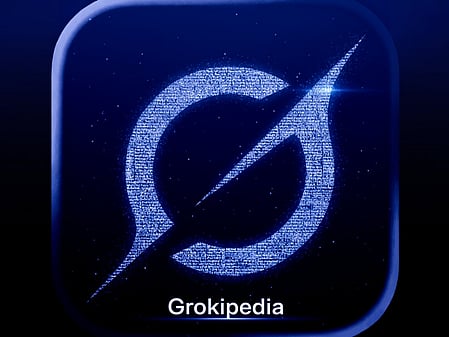Explainer: You've used Wikipedia, now meet Grokipedia, its AI-powered rival
The world of digital knowledge just got a new heavyweight contender: Grokipedia

If Wikipedia reinvented how the world crowd-sourced information, Grokipedia is aiming to redefine how we trust it.
That, in theory, is the ideal.
Except that Grok, like any other large-language model (LLM), can sometimes engage in "hallucinations".
Can it be trusted to tell you unbiased truth?
Read on...
What is Grokipedia?
Launched in late 2024, Grokipedia is an artificial intelligence-powered encyclopedia built to compete directly with Wikipedia.
Instead of relying on millions of volunteer editors, Grokipedia generates and updates content automatically, using AI to synthesise facts and cite verifiable sources in real time.
Who created it?
Created by Elon Musk’s xAI and powered by its flagship language model Grok, Grokipedia introduces a fresh, AI-driven spin on the encyclopedia concept — one that promises speed, accuracy, and what Musk calls “truth without censorship.”
Why did Musk create it?
Musk has long criticised Wikipedia for what he sees as “editorial bias” and “activist curation.” He argues that the platform’s community-driven model often distorts sensitive topics, especially in politics and science.
With Grokipedia, Musk wants to strip away that subjectivity.
His vision, according to xAI, is to “accelerate human understanding through uncensored, factual information.”
The project was built by software developer Jason A. Bloomer, who describes Grokpedia as a “truth-first” platform — one that prioritises transparency and verifiable data over opinion.
Together, Musk and Bloomer see it as a step toward democratizing knowledge globally.
How does it work?
When you search a topic, Grokpedia either retrieves a saved entry or instantly creates a new one — complete with references. Each page is then stored and indexed for future users, allowing the system to grow dynamically with every query.
Think of it as a living, self-updating knowledge base — part encyclopedia, part real-time AI researcher.Grokpedia’s workflow is both simple and futuristic:
Check for existing content. If a page already exists, it’s instantly retrieved.
If not, generate one. The Grok 3 AI compiles the latest verified data and sources — such as recent climate stats showing a +0.43°C global temperature anomaly in September 2025.
Save and share. That new entry becomes part of Grokpedia’s permanent, searchable archive.
The promise is that over time, this system creates an expanding, AI-generated web of factual content that updates itself with every search.
The Pros and Cons
The upside
Grokpedia’s biggest draw is speed and freshness. Unlike Wikipedia, which can lag during breaking news events, Grokpedia can instantly generate new entries — from climate reports to the latest headlines on government projects. Its AI-driven summaries also avoid human edit wars and lengthy editorial disputes.
The catch
While Grokpedia promises neutrality, it inherits the same risks as any AI — occasional factual slip-ups or questionable tone.
Grok itself has faced criticism for controversial or off-color responses, sparking debate over whether “AI truth” can ever be entirely bias-free.
Still, its integration with X (formerly Twitter), Tesla vehicles, and Optimus robots gives Grokpedia a built-in ecosystem few rivals can match.
How to try it
You can explore the platform at grokipedia.com or simply ask Grok a question on X.
Each query contributes to the platform’s growing archive, making every user part of its evolution.
xAI regularly posts updates on X as Grokpedia continues to expand.
Does Grok hallucinate?
Grok, like any large language model (LLM), can hallucinate.
In AI terms, hallucination means the model generates text that sounds plausible but is factually incorrect, misleading, or entirely fabricated. Since Grok is trained (like me) on large datasets of text, it doesn’t “know” truth in a human sense; it predicts the next best word based on patterns in data.
That means:
It can invent facts, dates, statistics, or quotes if it hasn’t been trained on enough reliable data.
It may confidently assert wrong information — because it optimises for fluency and coherence, not factual accuracy.
It may also blend real information with imagined details, making it harder to spot errors.
X (Twitter) positions Grok as being more “funny and rebellious,” which means it’s even more likely to produce creative or cheeky hallucinations compared to stricter models.
The bottomline
Grokipedia isn’t just another Wikipedia clone.
It’s Musk’s grand experiment in how AI can shape collective knowledge.
Still in its early stages, the platform is already generating buzz for its promise of unfiltered, machine-curated "truth".
Whether it truly replaces Wikipedia or becomes another niche experiment remains to be seen.
Grokipedia marks the start of a new era in how humans and machines build — and debate — the truth.
Sign up for the Daily Briefing
Get the latest news and updates straight to your inbox
Network Links
GN StoreDownload our app
© Al Nisr Publishing LLC 2026. All rights reserved.